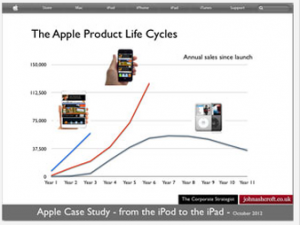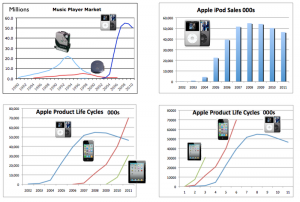Has Apple’s iPod finally reached the end of it’s product life cycle?
After its release, the iPod forever changed the way we look at mp3 players. Initially hitting the market in 2001, it became the most popular and recognizable portable music device. This can be attributed to it’s success in the introduction phase. The distinctive click wheel and white head phones that gave the iPod its iconic look and popular product design. They spent a lot on advertisement and saw minimal profit. Practically everyone had some kind of iPod growing up, and Apple was constantly renovating and improving it.
In 2001, when it was first introduced, they sold a total of 125,00 units. By 2006, they were up to 88 million iPods sold. This was when iPod really entered the growth stage. The product design began to stabilize and they continued to enhance and upgrade its ability and capacity. This was also when Apple really started to heavily advertise. The white headphones continued to be a stable of the iPod and Apple capitalized on this with advertising. This also allowed them to have customers advertise for them. Anytime you saw someone using white headphones, you knew it was an iPod without even seeing the iPod. The fact that they could have successful advertising without even showing the device was an amazing accomplishment.
Sales peaked in 2008, and at this point they sold over 157 million iPods. This signified the beginning of the maturity stage as sales started to slow down and stabilize. Competitors were established and ultimately realized they had little chance of competing with the iPod. Apple was also able to reduce cost and improve production. By 2010, 275 million iPods were sold. Most customers at this point are repeat buyers and want to upgrade their previous device.
In 2014, almost 13 years and 26 models later, the iPod seems like it has finally reached the end of it’s product life cycle, and is seeing the effects of the decline stage. Profits for the year are down 52% compared to this time last year, and is expected to drop even further. On top of this Apple has greatly reduced the amount of time and money spent on enhancing and advertising. The newest iPod release was the 5th generation iPod touch, and that was in May of 2013. In 2014 they released colors for the 5th generation, but it has been over a year since the last iPod model was released, and this is the longest gap in the devices history.
Reasons for this are believed to be a result of consumers expecting more from their devices. Instead of buying a iPods, Apple consumers are buying iPhones and iPads instead.


Steve Jobs joked in 2007 when the iPhone was released that the iPhone was “the best iPod we’ve ever made”. I wonder if he realized how correct he was, or that the iPhone would eventually replace the iPod all together. iPhones and iPads offer the same music capabilities of the iPod, but with much more ability, including thousands of mobile apps, accessible internet, and many ways to connect and communicate.
Do you think the iPod will rebound or has it completed its life cycle?
What are some reasons the iPod has seen a decline in sales?
How was Apple able to create such a long and successful product life cycle? It has taken over a decade for the iPod to reach the decline stage.
Sources:
http://jkaonline.typepad.com/jkaonline/2011/04/apple-case-study-from-the-ipod-to-the-ipad-product-life-cycles-and-growth-potential.html
http://www.bbc.com/news/technology-25927366
http://www.macworld.co.uk/news/apple/analyst-ipod-touch-final-stage-its-product-life-cycle-3407151/

This post made me truly think about my experience with the product life cycle of the iPod. I believe that the iPod is reaching its completion of the product life cycle. Consumers are no longer interested in having multiple devices, they want one single device that can do everything. It simply does not make sense to buy an iPod for $200 when you could buy an iPhone for the same price and it does so much more. Apple should re-asses their product lines and discontinue the manufacturing of the iPod.
Technology has developed to the point where it eliminates products like the iPod. iPhones have replaced the iPod, as it allows you to store high quantity of music. The iPhone provides more features than the regular iPod, which looks more preferable to the consumers. For this reason, I don’t think that the iPod will rebound. Apple has been able to create such a long life cycle because of its innovativeness. Creating products that satisfy’s our wants helped its business boom. Depending how innovative Apple can stay, Apple has the potential to be a lucrative business for a long time.
I think your analysis is stop on here. The iPod is reaching the end of its life cycle. I think the main reason for iPods slowing sales is regarding the changing tide of the market. I mean who would carry around an iPod when their phone will do everything that their iPod does (games, music and internet). In today’s society carrying around both items is almost redundant.
I think Apple was able to get the iPod life cycle to be very long because of the cumulative iterations that added the latest features and pushed the envelope on what an mp3 player could do. First the click wheel, then color screens, video playing, huge hard drives, touch screens and finally app store. Apple always enhanced the product enough to get people interested and willing to buy more. I think this is what helped the iPod maintain such a long lasting life cycle versus other technology products.